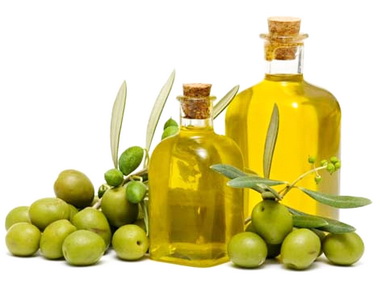FATS and OILS – Fatty acids
Health and essential saturated fatty acids, polyunsaturated and unsaturated fats and oils
 Looking at Table 1 (Chapter 1.a) you will notice that oils are extremely rich as a source of energy (900 Kilocalories per 100 grams olive oil, sunflower oil, flax oil, grape seed oil, corn oil, etc). Fats are very rich in energy as well.
Looking at Table 1 (Chapter 1.a) you will notice that oils are extremely rich as a source of energy (900 Kilocalories per 100 grams olive oil, sunflower oil, flax oil, grape seed oil, corn oil, etc). Fats are very rich in energy as well.
Chemically speaking, both can be considered to be fatty acids.
There are essential oils and fats that contain vitamins (vitamin E, vitamin F, etc …). They are called “essential” because our body is not able to synthesize them.
However, in the modern world we talk a lot about severe health problems linked to a diet rich in fats and oils. Actually, the problem needs to be further explained.
Chemically speaking, fats and oils contain three types of fatty acids:
1. Saturated fatty acids (dangerous for health);
2. monounsaturated fatty acids (not dangerous for health, can contain vitamins);
3. polyunsaturated fatty acids (not dangerous for health, can contain vitamins).
Saturated fats, or bad fats, are present in most animal fats, in margarine and in fats used in pastry shops. GM food has been recently suspected to contain them as well (1207). Saturated fatty acids, or bad fats, cause very severe alterations to cell membranes. They replace
vitamin F (good fatty acids), and cause severe forms of cell wall impermeability for many substances like glucose (that might cause Type 2 Diabetes), apoptotic vitamins (that might cause cancer and tumours in general), and other substances that are vital for cells, such as vitamin C (that might cause heart attack, strokes etc).
On the contrary, unsaturated fats (good fats) are made of cis-cis fatty acids, that are typically contained in cold-worked vegetable oils. Unsaturated fats (vegetable oils) are present in many plant seeds (SEE Table 2), and in some animals, such as some fat fish that live in cold waters (salmons, herrings).
Fatty acids are vital for muscle cells to produce energy for them during physical activity and to relax them (1208).
Furthermore, good fatty acids control blood coagulation (1209).
They also influence the release of CCK, a hormone that tells our brain that we ate enough and that,we should stop eating (1210).
They contribute to maintaining conduction speed in motor and sensory nerves as well (1211).
They can keep our skin healthy (1212).
They reduce high blood pressure (1213).
They reduce lung cancer (Pardini R.S.: Nutritional Intervention with Omega-3 Fatty Acids in a case of Malignant
Fibrous Histiocytoma of the Lungs, Nutrition and Cancer 2005, 52 (2) , pp.: 121-129
It is useful to give a bit more detail about the vitamins contained in these oils.
Alpha-Lipoic Acid
Alpha-lipoic acid is an essential fatty acid that contains organic sulphur (as it is organic, that is, linked to biological molecules, it is not toxic). It directly helps making brain, muscle and skeleton energy available during physical activity (1208), controlling diabetes as well (1214).
Alpha-Linolenic Acid
Alpha-linolenic acid is a cis polyunsaturated fatty acid present in cold-worked flax seed oil. It is transformed into EPA and DHA (Omega 3 fats), that are difficult to find in food.
Source: The book Thousand Plants against Cancer without Chemo-Therapy, author Giuseppe Nacci, M.D
